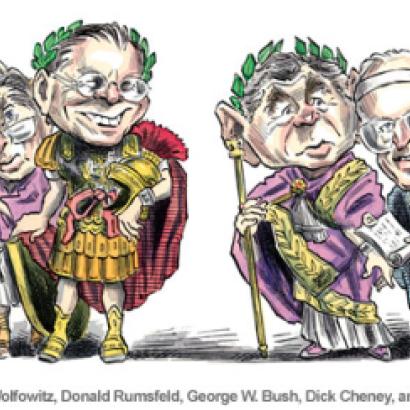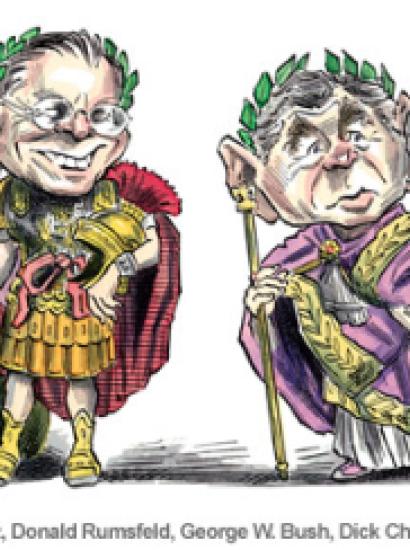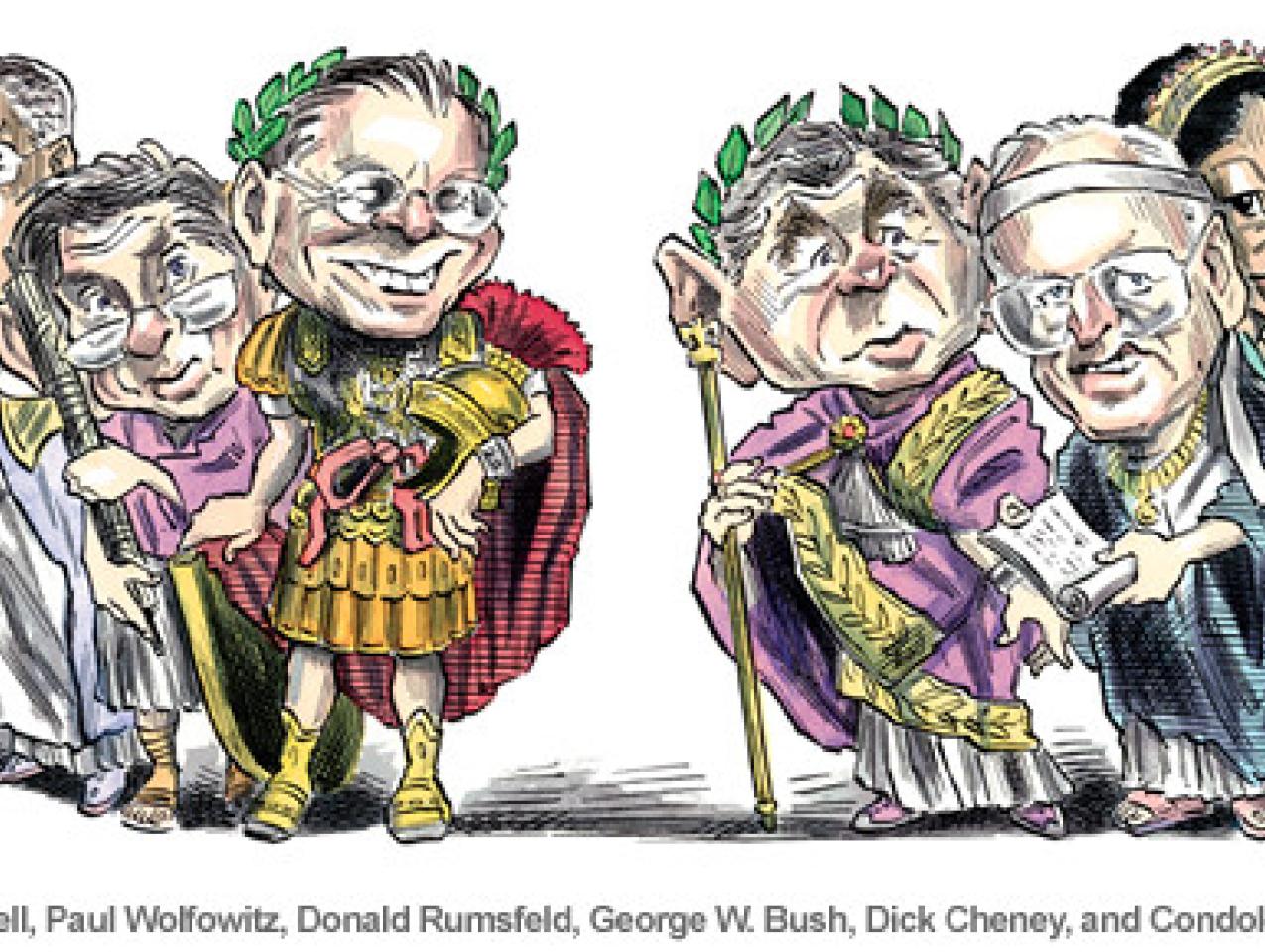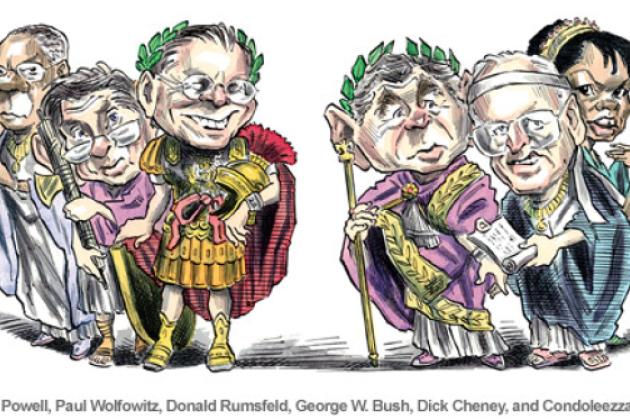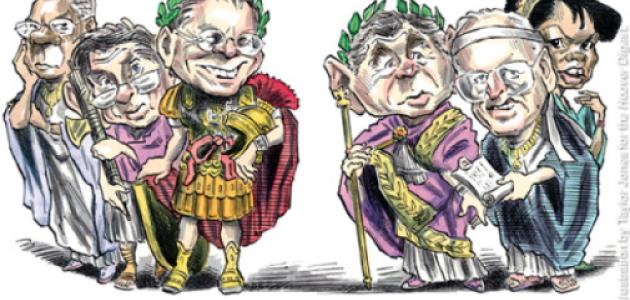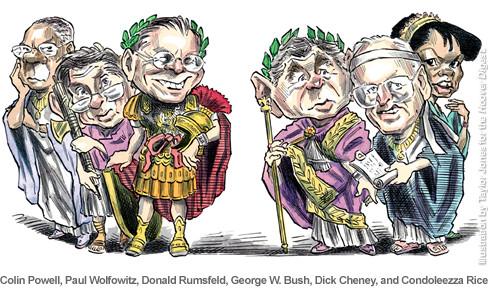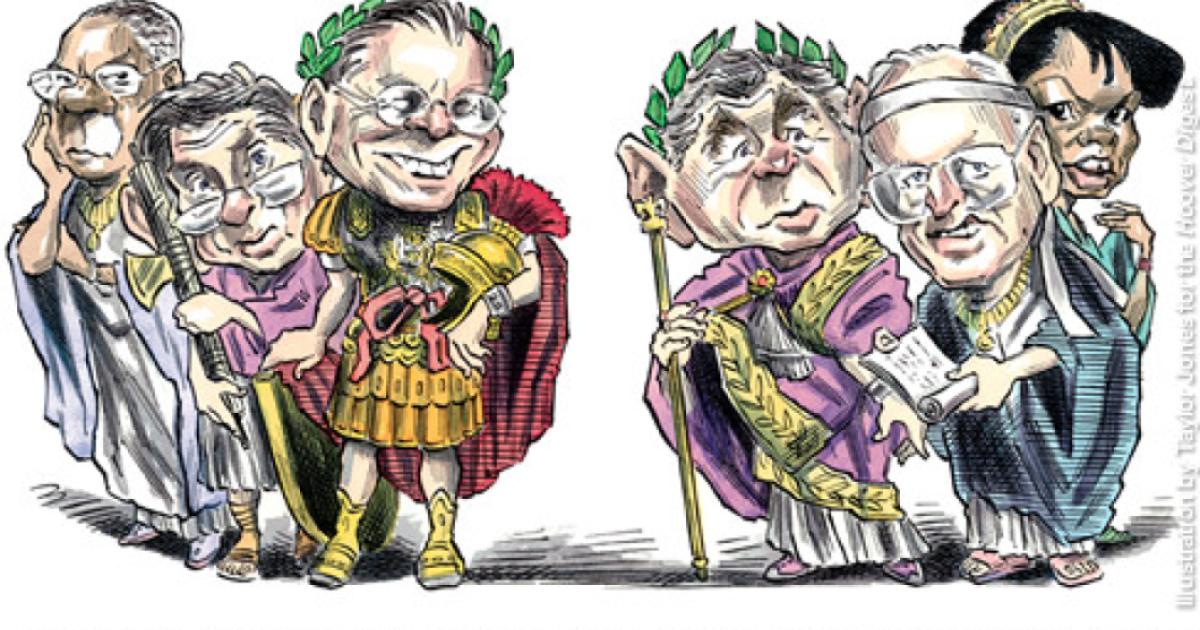- Contemporary
- International Affairs
- US Foreign Policy
- History
Pinkerton and Schwarzenegger
The United States today is an empire—but a peculiar kind of empire. It is vastly wealthy. It is militarily peerless. It has astonishing cultural reach. In the space of four years Americans have intervened militarily against three rogue states in the Balkans, Central Asia, and the Middle East. American troops are currently patrolling the streets of Kosovo, Kabul, and Kirkuk. Whatever the rationale, each U.S. incursion has led to a change of political regime, military occupation, and an attempt at institutional transformation euphemistically described as nation-building. Yet by comparison with other empires it often struggles to impose its will beyond its shores. Its successes in exporting American institutions to foreign lands have been outnumbered by its failures.
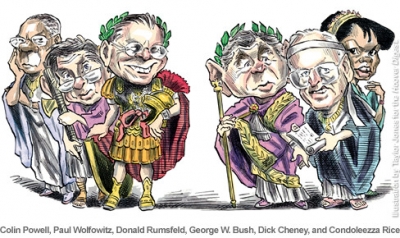
In many respects, this American empire shares the same aspirations and ambitions as the last great Anglophone hegemon. Despite originating in a revolt against British imperialism, the United States inherited many of its begetter’s defining characteristics. Styling itself, in good Whig terminology, an “empire of liberty,” the fledgling Republic embarked on an astonishingly rapid colonization of the central belt of the North American continent. If anything, the independent Americans expropriated indigenous peoples even more ruthlessly than they had as British subjects. However, the differences between the British and American empires became more apparent as the United States sought to extend its influence overseas. Its experiment with overt imperialism after 1898 had distinctly mixed results, ending unhappily in both the Pacific and the Caribbean, with the notable exceptions of Hawaii and Puerto Rico. Like the fickle Lieutenant Pinkerton in Puccini’s Madama Butterfly, American overseas interventions went through three phases: ardent in Act I, absent in Act II, anguished in Act III.
Only when the United States could cast itself in an anti-imperialist role— first against the British Empire during the Second World War and then (more wisely) against the Soviet Union during the Cold War—were Americans able to perform their own crypto-imperial role with self-confidence. Even then, there were clear limits to American stamina. The doctrine of limited war led to a draw in Korea and a defeat in Vietnam. Contradictory commitments undermined U.S. predominance in the Middle East too. It took a succession of humanitarian disasters abroad in the 1990s and terrorist attacks at home in 2001 to rekindle public enthusiasm for a more assertive U.S. foreign policy, though even this had to be cloaked in euphemism, its imperial character repeatedly denied.
The United States has invaded and occupied many countries over the past two centuries. Yet in terms of their economic and political institutions, relatively few of these have evolved into anything remotely resembling miniature Americas. Will things go any better in Kosovo, Afghanistan, or Iraq? And can President Bush live up to his implied threats to deal sooner or later with the other members of the “axis of evil,” Iran and North Korea—to say nothing of Cuba, Libya, and Syria, which were added to the list of rogue states in May 2002, as well as Burma and Zimbabwe, also singled out for presidential opprobrium in November 2003?
At the moment, simply imposing order in Iraq is proving difficult enough, even with British and Polish assistance. After all the bravado of the “three-week war,” the Bush administration quite quickly felt constrained to request assistance from the United Nations for the U.S.-established Coalition Provisional Authority. To have any hope of securing this, the United States had to promise to expedite the transfer of power from the Anglo-American coalition to an elected Iraqi government. American power also looked circumscribed in the Middle East. When George W. Bush visited the region in June 2003, some expressed the hope that the overthrow of Saddam would help break the deadlock in the Middle Eastern peace process, sending a signal to Syria and Iran that their support for terrorist organizations bent on the destruction of Israel would no longer be tolerated, bolstering the moderates among the Palestinian leadership and encouraging a skeptical Israeli government to take the route marked on the American “road map.” By the fall, however, Yasser Arafat had reasserted his control over the Palestinian administration, Ariel Sharon was building a replica of the Berlin Wall around the Palestinians, and for the first time Americans were being targeted by terrorists in the occupied territories. At the same time, Al Qaeda began to attack the one Arab autocracy that the United States had pledged itself to preserve, the house of Saud.
The Bush administration had meanwhile made equally little headway in dealing with what was surely the most dangerous of all the world’s rogue regimes, North Korea. Pyongyang’s development of long-range missiles and its research into nuclear, chemical, and biological weapons—to say nothing of its huge conventional armed forces—plainly posed a huge threat to the stability of East Asia. In December 2002 the North Koreans had repudiated a 1994 agreement shutting down its nuclear reactors and had expelled U.N. monitors; in October 2003 a North Korean Foreign Ministry spokesman threatened, somewhat opaquely, to “open [North Korea’s] nuclear deterrent to the public as a physical force.” Could the United States do anything about this? Apparently not—despite the fact that the country continued to depend on American aid to feed its half-starved population. Insisting that it be given not just handouts but a full-fledged nonaggression treaty with the United States, this repulsive little dictatorship defied the American hyperpower with impunity.
The United States even hesitated before sending a tiny force to the one basket-case country in Africa for which it can be said to have any historical responsibility, Liberia. In August 2003, three ships, carrying around 4,500 sailors and marines, were sent to Liberia after repeated requests for American intervention. In all, 225 U.S. personnel went ashore, of whom 50 succumbed to malaria. Two months later the Americans were gone.
This halfhearted African adventure seemed to exemplify the limits of American power. But how are we to explain these limits? By most conventional measures of power—economic, military, and cultural—there has never been an empire mightier than the United States today. Its recent difficulties in achieving its foreign policy goals cannot simply be blamed on the Bush administration’s alleged diplomatic ineptitude. Rather, we need fundamentally to rethink what we mean by power, for all too often we confuse that concept with other, quite different things—wealth, weaponry, and a winning way with “soft power.” It is in fact perfectly possible to have a great deal of all these things, yet to have only limited power. Indeed, that is precisely the American predicament.
The election of the actor Arnold Schwarzenegger as governor of California in October 2003 offered an important clue to the nature of American power. In his most recent film, Terminator 3, Schwarzenegger plays a muscle-bound and almost indestructible robot, programmed to protect a young man who is destined to save the world. The film abounds in irony, not all of it intentional. In the climactic scene, the Terminator’s operating system becomes corrupted; instead of rescuing the future savior, he comes close to killing him. As his original program battles this contradictory command, the word abort flashes in bright red letters in his head, all but paralyzing him.
In three distinct ways the Terminator is a perfect, if unwitting, metaphor of American power. Although he has the body of a man half his age, Schwarzenegger himself is in fact just four years short of his 60th birthday. His determination to remain forever Mr. Universe typifies the determination of an entire generation never to grow old, though grow old they must—with significant economic consequences. The Terminator is also a very American hero for the simple reason that there is only one of him. In this he personifies the chronic manpower shortage that currently constrains American nation-building. Above all, the Terminator exemplifies the limits of American power because the word abort starts flashing in his head before he has completed his mission. Outwardly, Arnold Schwarzenegger is without question a colossus; it is hard to imagine the male body looking any bigger or stronger. He is to the human frame what the United States is to the capitalist economy. Yet his character embodies the three key deficits that explain why America only looks immensely strong without actually being immensely strong.
Three Deficits
Three fundamental deficits together explain why the United States has been a less effective empire than its British predecessor. They are its economic deficit, its manpower deficit, and—the most serious of the three—its attention deficit.
Since 1985, as we have seen, the United States has gone from being a net international creditor to being the world’s biggest debtor: its net international liabilities are now equivalent to around a quarter of its gross domestic product. America’s reliance on foreign capital is a balancing act on a very high wire. One plausible and troubling scenario is that foreign expectations could shift, leading to simultaneous pressure on the exchange rate and bond prices, with higher yields threatening American growth via mortgage rates and the housing market.
Equally troubling is America’s manpower deficit. There is undoubtedly something perplexing about the apparent shortage of American combat-effective troops at a time when the American prison population exceeds 2 million—14 times the number of American troops in Iraq. Those who warned last year that the force assigned to occupy Iraq after the fall of Saddam Hussein was too small have since been vindicated. Remarkably, the U.S. military presence in Iraq as I write is almost identical in size to the British presence in 1920. But in those days the population of the country was much smaller. The British had approximately one soldier for every 20 Iraqis; the United States has one for every 160.
Of the three deficits, however, it is the third that may prove the most difficult to overcome—namely, the attention deficit that seems to be inherent in the American political system and that already threatens to call a premature halt to reconstruction in both Iraq and Afghanistan. This is not intended as a term of abuse. The problem is systemic; it is the way the political process militates against farsighted leadership.
Retired general Anthony Zinni has commented: “We should believe that a stable world is a better place for us. If you had a policy and a forward-leaning engagement strategy, the U.S. would make a much greater difference to the world. It would intervene earlier and pick fights better.” But such a strategy is much easier for a soldier to imagine than for an elected politician. It is not just that first-term American presidents have only two and a half years in office before the issue of securing reelection begins to loom. It is the fact that even sooner, midterm congressional elections can have the effect of emasculating their legislative programs. It is the fact that American politics operates on three tiers simultaneously: the national, the state, and the local. How could Californians be expected to pay full attention to the problems of nation-building in Baghdad in the summer of 2003, when a self-selected mob of amateur politicians was noisily bidding to recall their incumbent governor? It is the fact that the federal executive itself is anything but a homogeneous entity. Interdepartmental rivalry is of course the norm in most human institutions of any size. But there were times in 2003 when the complete absence of coordination among the Defense Department, the State Department, and the Treasury—to say nothing of the Commerce Department, the trade representative, the U.S. Agency for International Development, and the host of institutions now notionally concerned with “homeland security”—recalled the worst “polycracy” of Wihelmine Germany. The presidency is of course an elected rather than a hereditary office, but its recent incumbents have sometimes appeared to conduct business in the style of the last German kaiser, allowing policy to be determined by inter-agency competition rather than by forging a sense of collective responsibility. Small wonder so many American interventions abroad have the spasmodic, undiplomatic quality of Wilhelm II’s Weltpolitik. Imperial Germany too practiced what Michael Ignatieff has called imperialism in a hurry. It too was “impatient for quick results.”
Unlike the kaiser’s Germany, however, the United States disclaims any interest in acquiring new “places in the sun.” Its conquests are not merely temporary; they are not even regarded as conquests. The Victorian historian J. R. Seeley famously joked that the British had built their empire “in a fit of absence of mind.” Americans, however, have gone one better; here absent-mindedness has become full-blown myopia. Few people outside the United States today doubt the existence of an American empire; that America is imperialistic is a truism in the eyes of most educated Europeans. But as the theologian Reinhold Niebuhr noted as long ago as 1960, Americans persist in “frantically avoiding recognition of the imperialism [they] in fact exercise.”
Does imperial denial matter? The answer is that it does. Successful empire is seldom solely based on coercion; there must be some economic dividends for the ruled as well as the rulers, if only to buy the loyalty of indigenous elites, and these dividends need to be sustained for a significant length of time. The trouble with an empire in denial is that it tends to make two mistakes when it chooses to intervene in the affairs of lesser states. The first may be to allocate insufficient resources to the nonmilitary aspects of the project. The second, and the more serious, is to attempt economic and political transformation in an unrealistically short time frame. At the moment, the United States would seem to be making these mistakes in both Iraq and Afghanistan. By insisting—and apparently intending—that they will remain in Iraq only until a democratic government can be established “and not a day longer,” American spokespeople have unintentionally created a further disincentive for local people to cooperate with them. Who in these countries can feel confident that, if he lends support to American initiatives, he will not lay himself open to the charge of collaboration as soon as the Americans go? “If the people of the Balkans realized America would be there,” General John Shalikashvili remarked in the late 1990s, “it would be great. . . . Why is it such a crime to suggest a similar longevity [to the occupations of West Germany and Japan] in Bosnia and Kosovo?” The answer is a political one. Today’s GIs must be brought home, and soon.
These two points help explain why this vastly powerful economy, with its extraordinary military capability, has had such a very disappointing record when it has sought to bring about changes of political regime abroad. The worst failures—in Haiti, Cuba, and Vietnam—were due, above all, to this fatal combination of inadequate resources for non-military purposes and a truncated time horizon. It would be a tragedy if the same process were to repeat itself in the Balkans, Afghanistan, and Iraq. But it would not be a surprise.
Isolation (and Its Dangers)
Today’s transnational threats such as terrorism, nuclear proliferation, and organized crime—to say nothing of disease pandemics, climate change, and water shortages—put a premium on cooperation, not competition, between states. The attractions of unilateralism are undeniable, since demanding allies can be more irksome than invisible foes, but a solo strategy offers little prospect of victory against any of these challenges; the successful prosecution of the “wars” against all of them depends as much on multilateral institutions as does the continuation of international free trade. There is, in any case, nothing more dangerous to a great empire than what the Victorian Conservatives called, with heavy irony, splendid isolation. Then, as now, the great Anglophone empire needs perforce to work in concert with the lesser—but not negligible—powers in order to achieve its objectives. American success after both the Second World War and the Cold War was closely linked to the creation and extension of international institutions that at once limited and yet legitimized American power.
Consider the question of peacekeeping. It has become abundantly clear that the United States is not capable of effective peacekeeping—that is to say, constabulatory duties—in countries as far apart as Kosovo, Afghanistan, and Iraq without some foreign assistance. Peacekeeping is not what American soldiers are trained to do, nor do they appear to have much appetite for it. It also seems reasonable to assume that the American electorate will not tolerate a prolonged exposure of U.S. troops to the unglamorous hazards of “low-intensity conflict”: suicide bombers at checkpoints, snipers down back streets, rocket-propelled grenades fired at patrols and convoys. The obvious solution, short of a substantial expansion of the U.S. Army, is to continue the now well-established practice of sharing the burdens of peacekeeping with other U.N. members—in particular, America’s European allies, with their relatively generous aid budgets and their large conscript armies. If they are not used for peacekeeping, it is hard to see what these soldiers are for in a Europe that has declared perpetual peace within its own borders and is no longer menaced by Russia.
Ultimately, all empires depend in some measure on money. Without hefty investment in enforcing the rule of law, countries like Afghanistan and Iraq will stagnate and perhaps disintegrate. Unless the United States is prepared to radically alter its attitudes toward low-intensity conflict, it will have little option but to cooperate with the more generous Europeans. Unilateralism, like isolation, is not so splendid after all. Indeed, it is seldom a realistic option for an empire.
The danger is that great-power cooperation could simply break down, not because of rivalry between the United States and the European Union but because both lack the will to act beyond their own borders. The internal problems of these huge and complex entities may simply distract them from the problems of failed states and rogue regimes.
The Terminator
The paradox of globalization is that, as the world becomes more integrated, so power becomes more diffuse. Thanks to the dynamism of international capitalism, all but the poorest people in the world have significantly more purchasing power than their grandfathers dared dream of. The means of production were never more productive or—as China and India achieve their belated economic takeoffs—more widely shared. Thanks to the spread of democracy, a majority of people in the world now have markedly more political power than their grandfathers. The democratic means of election were never more widely accepted as the optimal form of government. The means of education too are accessible in most countries to much larger shares of the population than was the case two or three generations ago; more people than ever can harness their own brainpower. All these changes mean that the old monopolies on which power was traditionally based—monopolies on wealth, political office, and knowledge—have in large measure been broken up. Unfortunately, thanks to the proliferation of modern means of destruction, the power to inflict violence has also become more evenly distributed. Firepower has also been shared out as never before.
Power, let us not forget, is not just about being able to buy whatever you want; that is mere wealth. Power is about being able to get whatever you want at below the market price. It is about being able to get people to perform services or part with goods that they would not ordinarily offer to sell at any price. For empires—those ambitious states that seek to exert power beyond their own borders—power depends on both the resolve of the masters and the consent of the subjects. Yet power diminishes as it is shared. One country with one nuclear bomb is more powerful, if the rest of the world has none, than a country with a thousand nuclear bombs, if everyone else has one.
And this brings us to the final respect in which the United States resembles Arnold Schwarzenegger’s Terminator. In military confrontations, the United States has the capability to inflict amazing and appalling destruction, while sustaining only minimal damage to itself. There is no regime it could not terminate if it wanted to—including North Korea’s. Such a war might leave South Korea in ruins, of course, but the American Terminator would emerge from the rubble more or less unscathed. What the Terminator is not programmed to do, however, is to rebuild. In his wake he leaves only destruction.
During the fall of 2003 President Bush sought to stiffen American morale by declaring that he was “not leaving” Iraq; that America “doesn’t run”; that the Middle East “must be a focus of American policy for decades to come.” If, nevertheless, the United States finally submits to political pressure at home and abroad by withdrawing from Iraq and Afghanistan before their economic reconstruction has been achieved, the scene will not be wholly unfamiliar. The limits of American power will be laid bare when the global Terminator finally admits, “I won’t be back.”
The Case for Liberal Empire
Unlike most European critics of the United States, I believe the world needs an effective liberal empire and that the United States is the best candidate for the job. Economic globalization is working. The rapid growth of per capita incomes in the world’s two most populous countries, China and India, means that international inequality is finally narrowing. But there are parts of the world where legal and political institutions are in a condition of such collapse or corruption that their inhabitants are effectively cut off from any hope of prosperity. And there are states that, through either weakness or malice, encourage terrorist organizations committed to wrecking a liberal world order. For that reason, economic globalization needs to be underwritten politically, as it was a century ago.
The United States has good reasons to play the role of liberal empire, both from the point of view of its own security and out of straightforward altruism. In many ways too it is uniquely well equipped to play it. Yet for all its colossal economic, military, and cultural power, the United States still looks unlikely to be an effective liberal empire without some profound changes in its economic structure, its social makeup, and its political culture.
Although I have warned against the dangers of imperial denial, I do not mean to say that the existence of an American empire should instead be proclaimed from the rooftop of the Capitol. All I mean is that whatever they choose to call their position in the world—hegemony, primacy, predominance, or leadership—Americans should recognize the functional resemblance between Anglophone power present and past and should try to do a better rather than a worse job of policing an unruly world than their British predecessors. In learning from the history of other empires, Americans will learn not arrogance but precisely that humility which, as a candidate for the presidency, George W. Bush once recommended to his countrymen.
As the Colossus of our time seems to bestride the globe, unrivaled, it must heed the words of Tony Blair in his address to Congress in July 2003, “All predominant power seems for a time invincible, but in fact, it is transient.” The question Americans must ask themselves is just how transient they wish their predominance to be. Although the barbarians have already knocked at the gates—once, spectacularly—imperial decline in this case seems more likely to come, as it came to Gibbon’s Rome, from within.








